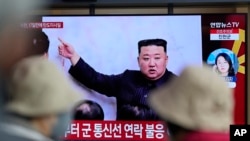North Korea denounced the U.N. Security Council for holding a meeting on its recent satellite launch upon "robbery demands" from the U.S., vowing to continue rejecting sanctions and taking "self-defensive" action, state media KCNA said Sunday.
The U.S. called for a Security Council meeting last week to discuss North Korea's attempt to put its first spy satellite in orbit, which ended in failure with the booster and payload plunging into the sea.
Kim Yo Jong, sister of North Korean leader Kim Jong Un and a powerful ruling party official, said the meeting was another sign that the council served as a U.S. "political appendage" by accepting Washington's "robbery demands" to ignore the country's right to space development.
"I am very offended that the UNSC routinely criticizes our exercise of sovereign rights as the United States wants, and strongly condemn and reject this as the most unfair, prejudiced act of interfering in internal affairs and infringing our sovereignty," Kim said in a statement carried by KCNA.
She said the satellite launch was a "legitimate, self-defensive countermeasure" against increasing threats from the U.S. and its allies, which Pyongyang has accused of rekindling tension with their annual springtime military drills.
North Korea will never acknowledge U.N. sanctions resolutions "even if they slap them hundred, thousand times," she said, pledging to continue exercising its sovereign rights, including launching spy satellites.
In another dispatch, KCNA published a commentary by Kim Myong Chol, whom it described as an international affairs analyst, criticizing a resolution adopted by the International Maritime Organization's security committee.
North Korea had informed the IMO of a time frame of its planned satellite launch, and the resolution strongly condemned the isolated country's missile tests "which seriously threatened the safety of seafarers and international shipping."
The analyst also accused the IMO of being "completely politicized" by following the U.S. and its allies' "anti-North Korea, hostile policy."
